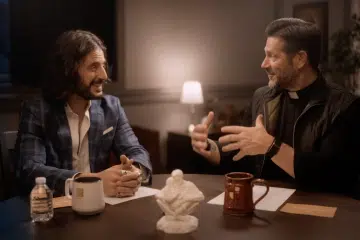Question of Faith: How can a twice divorced person be admitted to full communion?
Question of Faith is a Q&A column by Father Earl Fernandes
A reader asks:
“I would like to find out how I can get back to good graces in the church and receive Communion. I have been divorced twice. The first marriage was in the church and ended in divorce. My second marriage was in a Methodist church and also ended in divorce. I’ve been told by a friend that all I need to do is go to confession and then I can go to Communion. Is this true and is there any thing else I need to do?”
Dear Reader: You pose a question that affects a large number of Catholics today. A baptized Catholic is bound by what is known as the canonical form of marriage, in which the man and woman exchange marital consent in the presence of an authorized minister of the church with at least two witnesses present. When you said your first marriage was in the church, this is probably what you meant. When two baptized Christians validly exchange consent a sacramental bond is formed, and this bond become indissoluble, that is, no earthly power can dissolve it, after the marriage is consummated.
Jesus himself speaks to the original intention of the Creator who willed that marriage be indissoluble. The synoptic Gospels and the First Letter to the Corinthians all teach that one may not divorce and remarry; to do so is the moral equivalent of adultery. While some accommodations entered the Old Law due to the “hardness of hearts,” Jesus speaks to the plan of His Father from the beginning.
Your first marriage “in the church” was and is considered to be a valid, sacramental marriage. Sometimes couples separate or even civilly divorce, but this has no bearing upon the sacramental bond of marriage. There may be legitimate reasons for separating (mentioned in the church’s Code of Canon Law), and sometimes one of the spouses is an innocent victim of civil divorce. For a variety of reasons, people attempt a second marriage – loneliness, for the sake of children, etc. Nevertheless, the Catechism of the Catholic Church (n. 2384) states: “Contracting a new union, even if it is recognized by civil law, adds to the gravity of the rupture: the remarried spouse is then in a situation of public and permanent adultery.”
In his apostolic exhortation Familiaris Consortio (n. 84) Pope John Paul II, while acknowledging the many reasons why people divorce and remarry and encouraging pastoral solicitude toward those in such a situation, wrote: “However, the church reaffirms her practice, which is based upon sacred Scripture, of not admitting to eucharistic Communion divorced persons who have remarried. They are unable to be admitted thereto from the fact that their state and condition of life objectively contradict that union of love between Christ and the church, which is signified and effected by the Eucharist. Besides this, there is another special pastoral reason: if these people were admitted to the Eucharist, the faithful would be led into error and confusion regarding the church’s teaching about the indissolubility of marriage.”
The second marriage which you attempted in the Methodist Church, without going through the tribunal process of the Catholic Church would be considered invalid due to lack of required canonical form; that is the simplest kind of case to
present. Getting remarried outside of the Catholic Church put you in an objectively grave situation, in which you could not receive Communion.
A major question to consider is whether you have attempted to marry a third time. If you attempted to marry again outside church law, you may not return to the sacraments until you might be able to have your first marriage declared null for a canonical reason and your second marriage declared null due to a lack of canonical form. You will then be able to marry your current civil spouse in a Catholic ceremony, following necessary preparation.
If you are single and intend to remain so, to once again receive holy Communion and be in “good graces”, you should receive the sacrament of reconciliation or penance. The sacramental bond from your first marriage remains. You may have certain duties and obligations stemming from those relationships and may have to deal with issues such as loneliness and forgiveness, but God’s mercy is available to you, and the church is ready to welcome you home.
++++++++++
Father Fernandes, the dean of the Athenaeum of Ohio/Mount St. Mary’s Seminary, answers questions about the Catholic faith each month. Send your question for Father Fernandes to Editor-in-Chief Steve Trosley.














